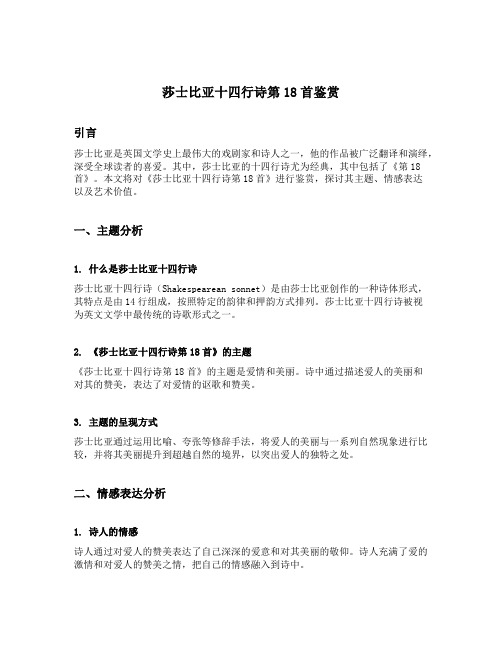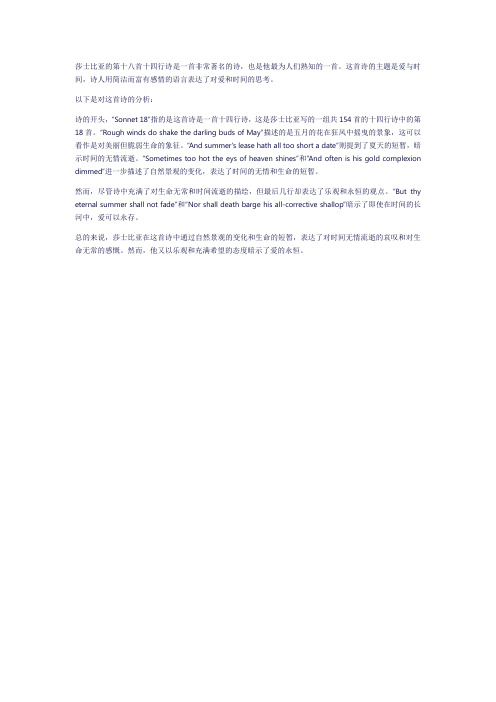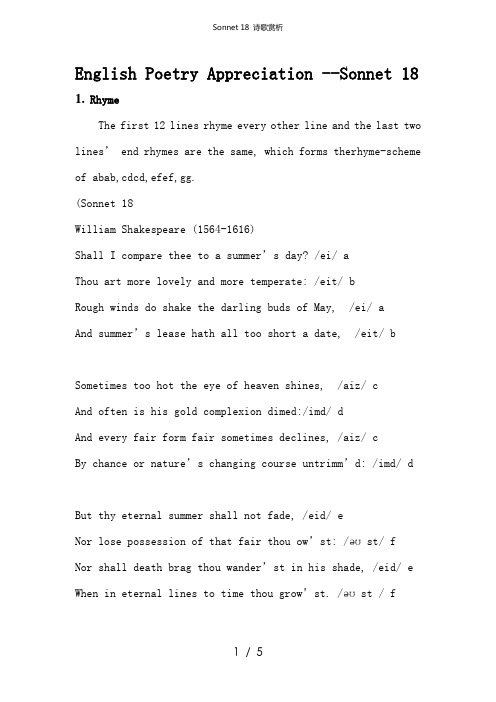Sonnet 18 威廉·莎士比亚
我用诗歌来永葆你的靓丽青春--莎士比亚十四行诗第18首论析

我用诗歌来永葆你的靓丽青春--莎士比亚十四行诗第18首论析张晓玲【摘要】Sonnet .18是莎士比亚十四行诗中的代表性诗篇。
该诗有着鲜明的起、承、转、合以及优美的音乐性。
头四行“起”,表明他所歌颂的年轻友人不同凡响的美;中间四行是“承”,讲岁月无情,青春难驻;后四行是“转”,宣告虽然别人的美貌难以存留,可他所爱的人却可以通过他不朽的诗篇得以永存;最后两行“合”,是对一首诗所作的小结,以富有思辨的语言总结了人类、诗歌艺术以及所歌颂对象之间的关联。
【期刊名称】《商丘师范学院学报》【年(卷),期】2014(000)004【总页数】3页(P79-81)【关键词】Sonnet .18;青春;时间;抗衡【作者】张晓玲【作者单位】商丘师范学院文学院,河南商丘476000【正文语种】中文【中图分类】I109.31一莎士比亚的《十四行诗集》大约创作于1590年至1598年之间,几百年来有关十四行诗的论著数量仅次于《哈姆莱特》。
诗歌以强烈的感情、深邃的思想、丰富的意象、优美的节奏和精妙的修辞等,在今天的莎学界引起了越来越多的兴趣和争论,而Sonnet.18则是诗集中的名篇。
整部诗集共154首,内容很复杂,往往若干首成一组,表现同一题材,在内容上既具有连贯性,又可独立成篇。
因此,在赏析Sonnet.18之前,要对诗集作全面的了解。
英国莎学家马隆和斯蒂文斯在1780年提出了“朋友说”和“黑女郎说”,即:诗集的前126首,写给一位美貌的贵族男青年(The Fair Lord);诗集的第127-152首,写给一位黑肤色女郎(The Dark Lady);最后两首、中间个别几首与故事无关。
在此之前,人们相信这些诗的大部或全部都是歌颂恋人的。
我国学者辜正坤先生则认为:“莎士比亚十四行诗的绝大部分是献给女性的,但不止一位女性;其中的一位是伊丽莎白女王;剩下的一小部分则是献给两位男朋友的,一位是伊丽莎白女王的宠臣艾塞克斯伯爵,另一位是艾塞克斯伯爵的心腹、莎士比亚的保护人南安普顿伯爵。
sonnet 18反思

sonnet 18反思
《Sonnet 18》是莎士比亚十四行诗中的经典之作。
诗歌结构、韵律优美,不仅描写了诗人“爱友”无与伦比的美貌,而且表达了诗人乃至整个人类希望真美永存的愿望。
同时,这首诗还体现了文艺复兴时期的人文主义思想,赞美了人类的尊严、价值和创造力。
Sonnet 18的主题是:爱征服一切。
莎士比亚的sonnet 18出自《莎士比亚十四行诗》,这本诗集收录了莎士比亚的十四行诗共154首,本诗是第十八首,也是较为著名的一首。
莎士比亚十四行诗大约创作于1590年至1598年之间,此时正是十六世纪欧洲文艺复兴传到英国的时期,因此,莎士比亚的十四行诗不仅结构巧妙,语汇丰富,也同时反映了这一时期的人文主义思想,具有很强的时代背景。
总之,莎士比亚的十四行诗在英国诗歌史上具有很高的地位,当得起空前绝后的美称。
本诗运用了“五步抑扬格”,使得节奏鲜明,观点突出。
在这首诗中,叙述者把他的爱人和夏季做成比较,并认为他的爱
人更好。
他还指出,他的爱人将通过这首诗永远活着。
”
莎士比亚的十四行诗总体上表现了一个思想:爱征服一切。
他的诗充分肯定了人的价值、赞颂了人的尊严、个人的理性作用。
诗人将抽象的概念转化成具体的形象,用可感可见的物质世界,形象生动地阐释了人文主义的命题。
莎士比亚十四行诗第18首鉴赏

莎士比亚十四行诗第18首鉴赏引言莎士比亚是英国文学史上最伟大的戏剧家和诗人之一,他的作品被广泛翻译和演绎,深受全球读者的喜爱。
其中,莎士比亚的十四行诗尤为经典,其中包括了《第18首》。
本文将对《莎士比亚十四行诗第18首》进行鉴赏,探讨其主题、情感表达以及艺术价值。
一、主题分析1. 什么是莎士比亚十四行诗莎士比亚十四行诗(Shakespearean sonnet)是由莎士比亚创作的一种诗体形式,其特点是由14行组成,按照特定的韵律和押韵方式排列。
莎士比亚十四行诗被视为英文文学中最传统的诗歌形式之一。
2. 《莎士比亚十四行诗第18首》的主题《莎士比亚十四行诗第18首》的主题是爱情和美丽。
诗中通过描述爱人的美丽和对其的赞美,表达了对爱情的讴歌和赞美。
3. 主题的呈现方式莎士比亚通过运用比喻、夸张等修辞手法,将爱人的美丽与一系列自然现象进行比较,并将其美丽提升到超越自然的境界,以突出爱人的独特之处。
二、情感表达分析1. 诗人的情感诗人通过对爱人的赞美表达了自己深深的爱意和对其美丽的敬仰。
诗人充满了爱的激情和对爱人的赞美之情,把自己的情感融入到诗中。
2. 诗中情感的转折《莎士比亚十四行诗第18首》中情感经历了由赞美到忧伤的转折。
在诗的前几行,诗人对爱人进行了赞美,表达了自己对其美丽的深深敬仰之情。
然而,在诗的后半部分,情感转向了忧伤,诗人担心时间的流逝会将爱人的美丽消逝,这种忧伤的情感为整首诗增添了深刻的情感色彩。
三、艺术价值分析1. 诗歌运用的修辞手法《莎士比亚十四行诗第18首》使用了丰富多样的修辞手法,比如比喻、夸张、对比等,这些修辞手法使整首诗充满了艺术魅力,具有很高的艺术价值。
2. 渲染的意境诗中通过对爱人美丽的描绘和对时间流逝的担忧,营造了一种诗意的意境。
诗人通过对自然现象的描绘,将爱人的美丽与大自然相较,突出了爱人的独特之处,同时也增加了诗歌的艺术感染力。
3. 对爱情的思考《莎士比亚十四行诗第18首》可以说是对爱情最美丽和深刻的思考之一。
莎士比亚第十八首十四行诗

莎士比亚的第十八首十四行诗是一首非常著名的诗,也是他最为人们熟知的一首。
这首诗的主题是爱与时间,诗人用简洁而富有感情的语言表达了对爱和时间的思考。
以下是对这首诗的分析:
诗的开头,“Sonnet 18”指的是这首诗是一首十四行诗,这是莎士比亚写的一组共154首的十四行诗中的第18首。
“Rough winds do shake the darling buds of May”描述的是五月的花在狂风中摇曳的景象,这可以看作是对美丽但脆弱生命的象征。
“And summer's lease hath all too short a date”则提到了夏天的短暂,暗示时间的无情流逝。
“Sometimes too hot the eys of heaven shines”和“And often is his gold complexion dimmed”进一步描述了自然景观的变化,表达了时间的无情和生命的短暂。
然而,尽管诗中充满了对生命无常和时间流逝的描绘,但最后几行却表达了乐观和永恒的观点。
“But thy eternal summer shall not fade”和“Nor shall death barge his all-corrective shallop”暗示了即使在时间的长河中,爱可以永存。
总的来说,莎士比亚在这首诗中通过自然景观的变化和生命的短暂,表达了对时间无情流逝的哀叹和对生命无常的感慨。
然而,他又以乐观和充满希望的态度暗示了爱的永恒。
英国文学8.2 讲解Sonnet 18(课堂PPT)

只要人类呼吸,目放光芒, 诗行也会同长,使你命芳。
Speakers’ Corner
17
Sonnet 18 of Shakespeare
Structure
proposal (1-2) argument (3-12) conclusion(13-14)
18
Sonnet 18
Shall I compare thee to a summer’s day? ∨— ∨— ∨— ∨— ∨— a Thou art more lovely and more temperate: ∨— ∨— ∨— ∨— ∨— b Rough winds do shake the darling buds of May, — —∨— ∨— ∨— ∨— a And Summer’s lease hath all too short a date; ∨— ∨— ∨— ∨— ∨— b
7
音步:
我们知道凡是有两个以上音节的英文单词,都有重 读音节与轻读音节之分,在一句话中,根据语法、 语调、语意的要求,有些词也要重读,有些要轻读。 如He went to town to buy a book. I’m glad to hear the news. 英文中有重读和轻读之分,重读的音节和 轻读的音节,按一定模式配合起来,反复再现,组 成诗句,听起来起伏跌宕,抑扬顿挫,就形成了诗 歌的节奏。多音节单词有重音和次重音,次重音根 据节奏既可视为重读,也可视为轻读。读下面这两 句诗:
You are more lovely and more constant: Rough winds shake the beloved buds of May
And summer is far too short:
Sonnet 18 诗歌赏析

English Poetry Appreciation --Sonnet 18 1.RhymeThe first 12 lines rhyme every other line and the last two lines’ end rhymes are the same, which forms therhyme-scheme of abab,cdcd,efef,gg.(Sonnet 18William Shakespeare (1564-1616)Shall I compare thee to a summer’s day? /ei/ aThou art more lovely and more temperate: /eit/ bRough winds do shake the darling buds of May, /ei/ aAnd summer’s lease hath all too short a date, /ei t/ bSometimes too hot the eye of heaven shines, /aiz/ cAnd often is his gold complexion dimed:/imd/ dAnd every fair form fair sometimes declines, /aiz/ cBy chance or nature’s changing course untrimm’d: /imd/ dBut thy eternal summer shall not fade, /eid/ eNor lose possession of that fair thou ow’st: /əʊst/ fNor shall death br ag thou wander’st in his shade, /eid/ e When in eternal lines to time thou grow’st. /əʊst / fSo long as men can breathe, or eyes can see, /iː/ gSo long lives this, and this gives life to thee./iː/ g)2.MeterEach line in this sonnet is in iambic pentameter which means each line has five feet, usually an unaccented syllable followed by an accented syllable.For example,we can divide the first line into five independent feet as “Shall I / compare / thee to/ a sum / mer’s day?”with accents on shall,com,thee,a,mer respectively. (Sonnet 18William Shakespeare (1564-1616)Shall I/ compare/ thee to/ a sum/mer’s day?Thou art/ more love/ly and/ more tem/perate:Rough winds/ do shake/ the dar/ling buds/ of May,And sum/mer’s lease/ hath all/ too short/ a date:Sometimes/ too hot/ the eye/ of hea/ven shinesAnd of/ten is/ his gold/ complexion dimm’d;And eve/ry fair/ form fair/ sometimes/ declines,By chance/ or na/ture’s changing/ course un/trimm’d;But thy/ eter/nal sum/mer shall/ not fade,Nor lose/ posse/ssion of/ that fair/ thou ow’st;Nor shall/ death brag/ thou wan/der’st in/ his shade.When in/ eter/nal lines/ to time/ thou grow’st:So long/ as men/ can breathe/,or eyes/ can see,So long/ lives this/,and this/ gives life/ to thee.)3.The Rhetorical Devices3.1 Simile and Rhetoric QuestionExample: Shall I compare thee to a summer’s day?Simile: Summer and “you”are not similar on the surface, but virtually they are the representatives of beauty.Rhetoric Question:It is also a rhetorical question, that is, formally it’s a question.Readers don't need to answerbecause the answer is very clear.3.2 MetaphorExample:And summer’s lease hath all too short a date:The summer’s day is compared to a house, which is the thing we lend from the nature. Therefore, it’s period of use is limited, and it also insinuates the time that the duration of youth and beauty is limited.3.3 PersonificationExample:And often is his gold complexion dimm’d;Obviously the poet compares the sun to a man, so he depicts his complexion. (Complexion is usually used to describe someone.)3.4 HyperboleExample:But thy eternal summer shall not fade,According to the laws of nature, every beautiful thing will gradually lose their beauty, so how can the beauty of the person who the poet describes be eternal?4.ThemeIn the beginningquatrain, the poet compares his friend to a beautiful summer’s day in order to arouse readers’wonderful imagination. However, the poet realizes that the metaphor can’t express his high praise for his friend because summerwill fade away though it’s beautiful. Then how to make the beauty of his friend eternal? The poet finally thinks of the poetry. He thinks that with the power of the poem, he can make the beauty of his friend immortal. That is to say, the beauty of his friend is immoral in that the poetry is eternal.In a word, the poem expresses the two themes. For one thing, the poet highly praises the beauty of his friend, and foranother thing, the poet also eulogizes the poetry art’s beauty and immortality.。
莎士比亚十四行诗第十八首
诗歌赏析
• 这首诗的艺术特点首先是在于它有着双重主题:一是赞美 诗人爱友的美貌,二是歌颂了诗歌艺术的不朽力量。其次 就是诗人在诗中运用了新颖的比喻,但又自然而生动。 莎士比亚的这首诗为我们描绘了夏日的璀璨, 无论从形式还是内容,从主题方面还是语言 方面,都能堪称是诗歌中的精品。这首诗描 绘了生命与自然是永恒的和谐美好的存在, 唤起我们对生活和生命的热爱。它让我们感 到人与自然息息相融,它犹如大自然变幻的 感觉,掠过我们的发际,走过我们赏花于五 月的心田,并凝住我们美好的希望。这种贮 藏于心灵的永恒之美与世之真爱,应该为全 人类共同拥有,永世传唱。
And every fair from fair sometime declines,
By chance or nature's changing course untrimm'd: But thy eternal summer shall not fade
Nor lose possession of that fair thou ow'st,
三十七部戏剧、两首长诗和一百五十四首十四行诗。他的主要成
就是戏剧,被同时代的戏剧家称为“时代的灵魂”。而作为一位 伟大的诗人,其十四行诗也被称为奉献给世界的“不朽的绝唱” 。1616年,莎翁逝世。巧合的是,他的生卒同为4月23日。
Shall I compare thee to a summer's day?
译文: •
• • • • • • • • • • • • •
我能否将你比作夏天? 你比夏天更美丽温婉。 狂风将五月的蓓蕾凋残, 夏日的勾留何其短暂。 休恋那丽日当空, 转眼会云雾迷蒙。 休叹那百花飘零, 催折于无常的天命。 唯有你永恒的夏日常新, 你的美貌亦毫发无损。 死神也无缘将你幽禁, 你在我永恒的诗中长存。 只要世间尚有人吟诵我的诗篇, 这诗就将不朽,永葆你的芳颜。
William-Shakespeare-sonnet-18PPT课件
25
1) introduction to Shakespeare's Sonnets
• 154 sonnets:
• 1-126 addressed to a young man, beloved of the poet, of superior beauty and rank but of somewhat questionable morals and constancy
37 plays; divided into comedies, histories, and tragedies
12
The First Period(1590-1600):
The first period of Shakespeare’s dramatic composition was his apprenticeship in play writing.
20
• Which can be translated to;
• Good friend for Jesus sake forbear • To dig the dust enclosed here! • Blest be the man that spares these stones, • And curst be he that moves my bones.
Sonnet+18
Sonnet 18 To My Love by William Shakespeare(1564-1616)Shall I compare thee to a summer's day?Thou art more lovely and more temperate:Rough winds do shake the darling buds of May,And summer's lease hath all too short a date:Sometime too hot the eye of heaven shines,And often is his gold complexion dimm'd;And every fair from fair sometime declines,By chance, or nature's changing course, untrimm'd;But thy eternal summer shall not fade,Nor lose possession of that fair thou owest;Nor shall Death brag thou wander'st in his shade,When in eternal lines to time thou growest;So long as men can breathe, or eyes can see,So long lives this, and this gives life to thee.[威廉·莎士比亚(1564-1616)]是英国文艺复兴时期最伟大的戏剧家和诗人。
一生写了37部剧本。
他博采众长而又自有创造,在历史剧、喜剧、悲剧、传奇剧各方面都写出了杰作。
他的十四行诗在英国和世界文学史上占有重要的地位,是文艺复兴时代在英国诗坛上开放的绚烂花朵之一,是莎士比亚最重要的诗歌作品。
莎士比亚十四行诗第十八首
莎士比亚十四行诗第十八首莎士比亚十四行诗第十八首Sonnet 18 铁冰译文1 Shall I compare thee to a summer's day? 我该不该把你比作怡人的夏天?2 Thou art more lovely and more temperate: 你却比她更加可爱更加温情。
3 Rough winds do shake the darling buds of May, 五月的娇蕊总是被狂风吹断,4 And summer's lease hath all too short a date: 夏天也只是一道短暂的美景。
5 Sometime too hot the eye of heaven shines, 苍穹的目光有时会过于灼热,6 And often is his gold complexion dimm'd; 那金色的脸庞也常黯淡无光。
7 And every fair from fair sometime declines, 人间一切瑰丽终将失去秀色,8 By chance, or nature's changing course, untrimm'd; 湮没于不测风云和世事沧桑。
9 But thy eternal summer shall not fade, 但是,你常青的夏季永不消逝,10 Nor lose possession of that fair thou owest; 你拥有的美丽也将永不折损,11 Nor shall Death brag thou wander'st in his shade, 或许死神的阴影会笼罩着你,12 When in eternal lines to time thou growest; 你却和这不朽的诗句千古长存。
13 So long as men can breathe, or eyes can see, 只要人类还在呼吸、眼睛还在欣赏,14 So long lives this, and this gives life to thee. 我的诗就会活着,令你生命绽放。
- 1、下载文档前请自行甄别文档内容的完整性,平台不提供额外的编辑、内容补充、找答案等附加服务。
- 2、"仅部分预览"的文档,不可在线预览部分如存在完整性等问题,可反馈申请退款(可完整预览的文档不适用该条件!)。
- 3、如文档侵犯您的权益,请联系客服反馈,我们会尽快为您处理(人工客服工作时间:9:00-18:30)。
/dɪm/
A low level of lighting; lacking in brightness
它那赫奕的金容会转成阴晦;
Quatrain Ⅲ:
E:But thyeternal summer shall not fade,
F:Nor lose possession of that fair thou ow'st; E:Nor shall Death brag thou wander'st in his shade, F:When in eternal lines to time thou grow'st. Couplet:
<古>you
你却焕耀的更加可爱,也更加温婉;
/bʌd/ Rough winds do shake the darling buds of May,
A small protuberance on a stem or branch, sometimes enclosed in protective scales and containing an undeveloped leaf, flower, or leafy shoot.
1. Several kinds of rhetoric are used. (多种修辞学的应用)
Metaphor: “The eye of heaven” means the sun. Simile: “Shall I compare thee to a summer’s day?” uses simile to compare the loved to a summer’s day. Personification: “his gold complexion” personates the summer’s day and “shake the darling buds” uses “shake” to personate the rough winds. Inversion: “And every fair form fair sometimes declines” can be in the order like this: “And every fair sometime declines from fair”. “By chance, or nature’s changing course, untrimme’d” can be in the order like this: “untrimmed by chance or nature's changing course”.
/strɪp/ destroyed
任何美妙的形象会显得不美;
/ðaɪ/ the genitive case of the English personal pronoun thou
But thy enternal summer shall not fade,
eternal /ɪ'tɜ:nl/ flow away an infinite amount of time, or a timeless state
A:Rough winds do shake the darling buds of May,
B:And summer's lease hath all too short a date.
QuatrainⅡ: C:Sometime too hot the eye of heaven shines, D:And often is his gold complexion dimmed; C:And every fair from fair sometime declines, D:By chance or nature's changing course untrimmed.
但你这风华的永夏不会衰颓,
Nor lose possession of that fair thou ow ' st; /pə'zeʃn/ you possess
你不会丧失你这无比的修好;
Nor shall death brag thou wander 'st in his shade, /bræ ɡ/ wanderest
死亡不会夸耀,你在它的影下低回,
When in eternal lines to time thou grow ' st:
lines of poetry 有这些诗行将你的韶光永葆: growest
PS:古英语中第二人称单数的谓语加st或est
So long as men can breathe,or eyes can see,
/ði:/ Shall i compare thee to a summer's day?
<古>(thou的宾格)you(你) Here it may refer to a period or the season of summer
我可要将你比作初夏的清晖?
Thou art more lovely and more temperate;
2. Old English use (古英语的使用)
Thee: “you” as object Thou: “you” as subject Art: are Hath: has Thy: “your” followed by a consonant Thine:"yours"(课外补充的) 3. Images (意象) “A summer's day” means the season of summer. “Day” means a period of time. “Lease” means allotted time. “The eye of heaven” means sun. “His its” means sun. “Fair” means something beautiful. “This” means this poem.
/djʊˈre ɪʃən/
he length of time that something lasts or continues
孟夏的良时便会变得太短暂 ;
Sometime too hot the eye of heaven shines
晴空里赤日有时光照得过亮 /kəmˈpl ɛkʃən/
And often is his gold complexion dimmed;
具体意象分析: 莎士比亚所处的英国伊莉莎白时代是爱情 诗的盛世,写十四行诗更是一种时髦。莎士比 亚的十四行诗无疑是那个时代的佼佼者,其十 四行诗集更是流传至今,魅力不减。他的十四 行诗一扫当时诗坛的矫柔造作、绮艳轻糜、空 虚无力的风气。据说,莎士比亚的十四行诗是 献给两个人的:前126首献给一个贵族青年, 后面的献给一个黑肤女郎。这首诗是十四行诗 集中的第18首,属前者。也有人说,他的十四 行诗是专业的文学创作。当然,这些无关宏旨, 诗歌本身是伟大的。
2、 Sonnet 18 is iambic pentameter.(五步抑 扬格) Each line of Sonnet 18 has five feet with an unaccented syllable followed by an accented syllable. Examples are as follow: “Shall I / compare / thee to / a sum / mer’s day?” has accents on “shall”, ”com” ,”thee”, ”a,mer” respectively. “Thou art / more love / ly and / more tem / perate:” has accents on “thou”, “more”, “ly”, “more”, “pe” respectively.
只要人们还活着,眼睛还能看,
So long lives this,and this gives life to thee.
这首诗便能栩栩赋予你霞丹。
Quatra's day?
B:Thou artmore lovely and more temperate.
莎士比亚的十四行诗总体上表现了一个思想: 爱征服一切。他的诗充分肯定了人的价值、赞颂 了人的尊严、个人的理性作用。诗人将抽象的概 念转化成具体的形象,用可感可见的物质世界, 形象生动地阐释了人文主义的命题。 诗歌在形式上一改传统的意大利十四行诗四 四三三体,而是采用了四四四二体:在前面充分 地发挥表达的层次,在充分的铺垫之后,用两句 诗结束全诗,点明主题。全诗用新颖巧妙的比喻, 华美而恰当的修饰使人物形象鲜明、生气鲜活。 诗人用形象的表达使严谨的逻辑推理变得生动有 趣、曲折跌宕,最终巧妙地得出了人文主义的结 论。
狂风震撼五月天眷宠的嫩蕊,
/liːs/ /hæ θ/ And summer's lease hath all too short a date;
allotted time
/ə'lɒt/
it is the third person singular present tense of Have
duration
G:So long as men can breathe, or eyes can see,
G:So long lives this, and this gives life to thee.
1、The rhyme scheme of Sonnet 18 is ABABCDCDEFEFGG.
Sonnet 18 contains 14 lines. The ends of line 1 and line 3 have the end rhyme /ei/, line 2 and line 4 rhyme with /eit/. And these four lines form the first quatrain. The line 5 and line 7 have the end rhyme /aɪn/, while line 6 and line 8 have /d/. The same form is used in line 9 and line 11 and line 10 and line 2, which end with the rhyme /eɪd/ and / əʊst/. However, the last two lines have their own end rhyme which is /i:/.
